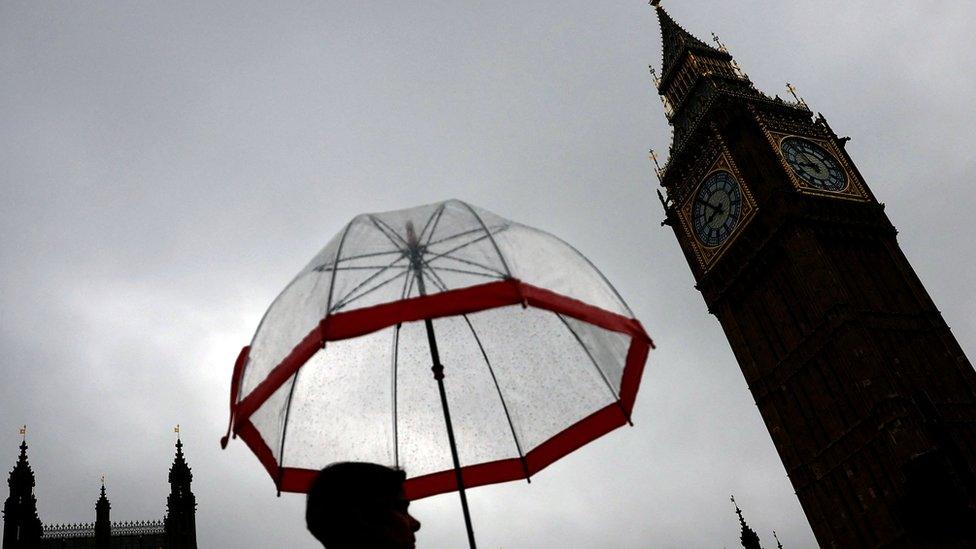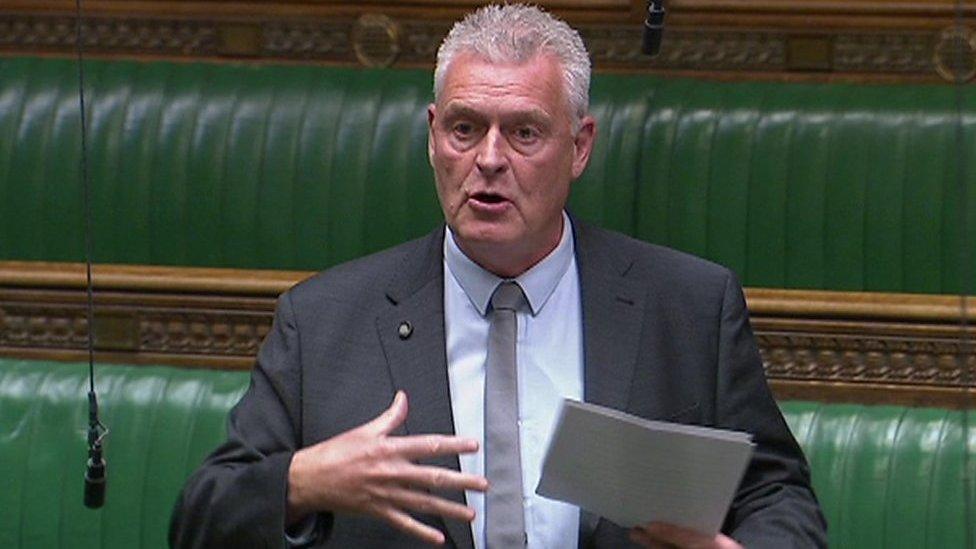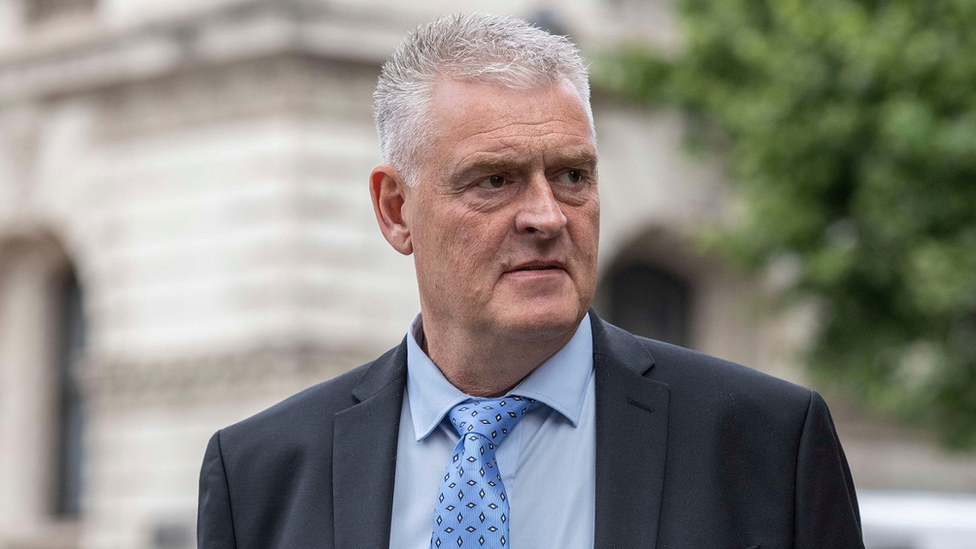What's happening in Parliament this week?
- Published

In the previous week, MPs concluded their debates a good two hours early on Monday, Tuesday, Wednesday and Thursday, and even when the debates were still live the chamber was practically deserted for much of the time.
The Leader of the Commons, Penny Morduant, who manages the government's law-making programme, told MPs that major bills are in the pipeline, and they would sit through the night to enact them, if necessary. But oddly, there's not much sign of long-promised measures, from the Small Boats Bill to the Media Bill, in the advance business for the next couple of weeks. And meanwhile the House languishes.
Perhaps an announcement about a deal on the Northern Ireland Protocol will inject some energy.
The week's raw politics highlight looks to be Lee Anderson's Westminster Hall debate on tackling poverty and the cost of food (Wednesday), with the Conservative deputy chairman doubling down on his earlier remarks and inviting his critics to have a go. It promises to be bracing.
Monday 27 February
Commons: Education Questions from 14:30, with any urgent questions or government statements following at 15:30.
The main debate will be on the Second Reading of the Lifelong Learning (Higher Education Fee Limits) Bill. This will allow the government's Lifelong Loan Entitlement to be rolled out from 2025. The idea is to support more people to take high-quality courses that meet the skills needs of employers, and that will get them into good jobs.
Westminster Hall: From 16:30 MPs will debate e-petition 619615, external, which calls for the start of the woodcock shooting season to be pushed back to 1 December. The petition attracted 107,916 signatures.
Committees: Newly-appointed National Security Adviser, Sir Tim Barrow, a former ambassador to both Russia and Ukraine, debuts before the Joint Committee on the National Security Strategy (16:20).
Lords: From 14:30 peers will rush through all stages of the Northern Ireland (Executive Formation) (Amendment) Bill, which postpones elections to the Northern Ireland Assembly in the absence of a devolved government.
After that the House resumes its long march through the detail of the Levelling-Up and Regeneration Bill (day three of eight committee days) with a list of amendments now so big it's visible from space.
Tuesday 28 February
Commons: From 11:30 it's the debut question time for the new Energy Security and Net Zero department.
Labour's Maria Eagle has a ten minute rule bill on the safety of multi-storey car parks, requiring minimum guard rail heights and 24-hour staffing.
The main debate will be Labour opposition day motions, which are yet to be announced.
Committees: Education (10:00) looks at preventing children being groomed as "runners" for county lines gang, transporting drugs.
Lords: The second day of Committee on the Retained EU Law (Revocation and Reform) Bill from 14:30.
Wednesday 1 March
Commons: Wales Questions from 11:30, followed by Prime Minister's Question Time at noon.
Then there's a tenminute rule bill from Conservative Mark Fletcher, who wants to prevent people accused of sex offences from changing their names.
The main debate is the remaining stages of the Social Housing (Regulation) Bill, including an instruction motion to allow the government to add new clauses requiring social housing providers to tackle hazards to tenants. This follows the case of two-year-old Awaab Ishak, who died in 2020, following "chronic exposure" to mould in a flat owned by social housing provider, Rochdale Boroughwide Housing.
The adjournment debate sees former Lord Chancellor Sir Robert Buckland arguing the government should enact more of the recommendations of the Law Commission for non-controversial tidying-up measures to improve the working of the law.

Awaab Ishak died from a respiratory condition caused by exposure to mould in his family home
Westminster Hall: Following on from his comments that nurses using food banks must be poor at budgeting, Conservative Deputy Chairman Lee Anderson has a debate on tackling poverty and the cost of food (16:30). Bring popcorn.
Committees: Transport (09:30) asks why so many major road upgrades are delayed and overbudget, with witnesses from Logistics UK, the AA and the Chartered Institute of Logistics and Transport.
Home Affairs (09:45) continues its inquiry into policing priorities with evidence from domestic abuse commissioner for England and Wales, Nicole Jacobs, plus representatives of the Crown Prosecution Service and charity Refuge.
Lords: National Security Bill - Report (15:00). There is a lot of heavy duty action here, with peers half-peeved, half-pleased by the last-minute arrival of 120 new amendments rewriting the bill's central feature, the Foreign Influence Registration Scheme, which brings in reporting requirements for contact with foreign state interests. The scheme had been criticised as heavy-handed and onerous. Meanwhile, the former reviewer of anti-terrorism legislation, Lord Carlile wants to put a new duty on political parties to identify donations from foreign powers.
My eye was also caught by an amendment to provide a public interest defence for whistle-blowers, signed by the likes of the former Solicitor General Lord Garnier, super-lawyer Lord Pannick and Lib Dem Lord Marks. This will be an interesting test of the government, which may not be totally against the amendment, so it's a matter of studying the small print of any ministerial response. And with the prospect of power now dangling before them, Labour's response will be equally interesting.
That's followed by some highly topical Brexit action as peers consider the Official Controls (Northern Ireland) Regulations 2023. This makes arrangements for red and green lanes for the movement of sanitary and phytosanitary goods between the UK, Northern Ireland and the Republic, with the red lane providing full EU checks and controls and full customs procedures. There's a regret motion from former DUP Leader Lord Dodds, who complains that the new arrangement "treats Northern Ireland like a foreign country".
Thursday 2 March
Commons: Transport Questions from 09:30, followed by the weekly update on the forthcoming Commons agenda from the leader of the House.
Then there are two backbench debates. The first is from Labour MP Sarah Champion, of the cross-party Safeguarding Alliance, on sex offenders changing their names. She says registered sex offenders are required by law to notify the police of any changes in their personal information, including a change of name, within three days. But the data demonstrates this is not happening and hundreds of registered sex offenders are going missing.
Second, a general St David's Day debate on Welsh affairs. (I know, St David's Day is 1 March - but this is as close as the Commons authorities could get...)
Westminster Hall: A debate on financial support for hospices (13:30).
Committees: Public Accounts (09:30) has a session on alcohol treatment services, with Labour's Dan Carden, who has spoken about his own alcohol issues, leading. Witnesses include senior Department of Health officials and public health alcohol services.
Lords: Peers are due to conclude committee consideration of the Retained EU Law (Revocation and Reform) Bill (11:00)
Friday 3 March
Commons: From 09:30 there are debates on more laws proposed by individual MPs, starting with Conservative Sally-Ann Hart's Child Support Collection Domestic Abuse Bill, which will allow for the collection of child maintenance by the government in cases involving domestic abuse to protect the parent or carer receiving the money.
Second is Bob Blackman's Supported Housing (Regulatory Oversight) Bill, which tightens the regulations for special housing provided for vulnerable tenants, including prison leavers, rough sleepers, refugees and drug abusers. The bill would allow councils to ban underperforming providers.
Third, Conservative Greg Smith's Equipment Theft (Prevention) Bill, which aims to regulate the second-hand tool market, where sellers currently do not have to prove the origins of items they are selling or evidence the original purchase.
Fourth, the Conservative Simon Fell has the Offenders (Day of Release from Detention) Bill, under which offenders scheduled for release on a Friday who also have mental health issues, substance misuse problems, or far to travel home, will be released on Wednesday or Thursday instead. The argument is that when prisoners are released on a Friday they have just a few hours to find a place to stay so they can end up sleeping rough, increasing their chances of committing further crimes.
All four bills have emerged from committee without amendment - a tell-tale sign of government backing. They're highly likely to be sent off to the Lords to complete their journey into law.
Lords: From 10:00 peers spend a day debating private members bills from the Commons: the Pension Dashboards (Prohibition of Indemnification) Bill; the Employment (Allocation of Tips) Bill; the Protection from Redundancy (Pregnancy and Family Leave) Bill and the Carer's Leave Bill. All look set fair to become law.
Related topics
- Published24 January 2023

- Published11 May 2022

- Published11 March 2024

